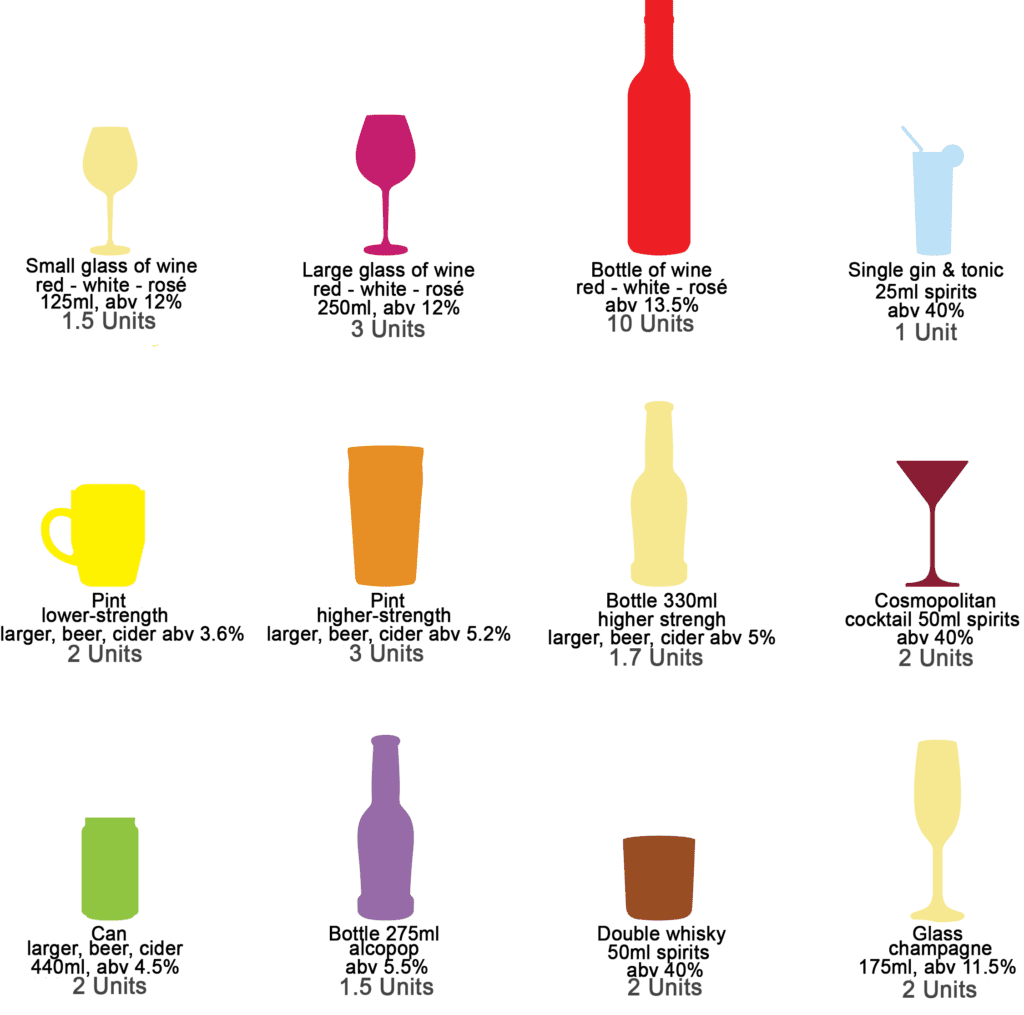Responsible Drinking
Banstead Vintners encourages responsible drinking in order to keep your health risks from consuming alcohol at a low level.
Weekly drinking guideline:
The Chief Medical Officers’ guideline for both men and women.
Adults who drink regularly or frequently i.e. most weeks.
- To keep health risks from alcohol to a low level it is safest not to drink more than 14 units a week on a regular basis.
- If you regularly drink as much as 14 units per week, it is best to spread your drinking evenly over 3 or more days. If you have one or two heavy drinking episodes a week, you increase your risks of death from long term illness and from accidents and injuries.
- The risk of developing a range of health problems (including cancers of the mouth, throat and breast) increases the more you drink on a regular basis.
- If you wish to cut down the amount you drink, a good way to help achieve this is to have several drink-free days each week.
Single occasion drinking episodes:
The Chief Medical Officers’ advice for men and women who wish to keep their short term health risks from single occasion drinking episodes to a low level.
This applies to drinking on any single occasion (not regular drinking, which is covered by the weekly guideline).
- Limiting the total amount of alcohol you drink on any single occasion.
- Drinking more slowly, drinking with food, and alternating with water.
- Planning ahead to avoid problems e.g. by making sure you can get home safely or that you have people you trust with you.
The sorts of things that are more likely to happen if you do not understand and judge correctly the risks of drinking too much on a single occasion can include:
- Accidents resulting in injury, causing death in some cases.
- Misjudging risky situations, and losing self-control (e.g. engaging in unprotected sex).
Some groups of people are more likely to be affected by alcohol and should be more careful of their level of drinking on any one occasion for example those at risk of falls, those on medication that may interact with alcohol or where it may exacerbate pre-existing physical and mental health problems.
If you are a regular weekly drinker and you wish to keep both your short- and long term health risks from drinking low, this single episode drinking advice is also relevant for you.
Pregnancy and drinking:
The Chief Medical Officers’ guideline is that:
- If you are pregnant or think you could become pregnant, the safest approach is not to drink alcohol at all, to keep risks to your baby to a minimum.
- Drinking in pregnancy can lead to long-term harm to the baby, with the more you drink the greater the risk.
The risk of harm to the baby is likely to be low if you have drunk only small amounts of alcohol before you knew you were pregnant or during pregnancy.
If you find out you are pregnant after you have drunk alcohol during early pregnancy, you should avoid further drinking. You should be aware that it is unlikely in most cases that your baby has been affected. If you are worried about alcohol use during pregnancy do talk to your doctor or midwife.
UK Chief Medical Officers’ – Low Risk Drinking Guidelines – August 2016:
View the full document here.
Alcohol units guide:

Helpful organisations:
- Drinkline
Drinkline runs a free, confidential helpline for people who are concerned about their drinking, or someone else’s.
The purpose of the Drinkline service is to offer free, confidential, accurate and consistent information and advice to callers who are concerned about their own or someone else`s drinking regardless of the caller`s age, gender, sexuality, ethnicity or spirituality.
Free helpline: 0300 123 1110 (weekdays 9am–8pm, weekends 11am–4pm)
Drinkaware is an independent charity working to reduce alcohol misuse and harm in the UK. We’re here to help people make better choices about drinking.
A UK wide treatment agency, helping individuals, families and communities to manage the effects of drug and alcohol misuse.
The British branch of this worldwide network, AA is an organisation of men and women who share their experience with each other hoping to solve their problems and help others to recover from alcoholism.
If you need help with a drinking problem you can contact Alcoholics Anonymous.
Free helpline: 0800 917 7650
Email helpline: help@aamail.org
Al-Anon is worldwide and offers support and understanding to the families and friends of problem drinkers.
Helpline: 020 7403 0888 (10am-10pm)
The national agency on alcohol misuse for England and Wales.
Provides general information about alcohol, and can help put you in touch with your nearest alcohol advice centre.
Helpline: 020 7928 7377
Information and advice for families of alcohol and drug users. The website has a list of local family support services.
Helpline: 020 7553 7640
Information, advice and support to children of alcohol-dependent parents and people concerned with their welfare through a free and confidential telephone and email helpline.
Free helpline: 0800 358 3456
Email helpline: helpline@nacoa.org.uk
Scotland’s national voluntary organisation. Provides information and advice on responsible drinking.
Helpline: 0141 572 6700
National drugs awareness site for young people and parents/carers.
Provides confidential non-judgmental emotional support, 24 hours a day for people who are experiencing feelings of distress, despair or suicide.
Helpline: 08457 90 90 90 (24hrs)
Email helpline: jo@samaritans.org (they try their hardest to get back to your email within 24 hours).

